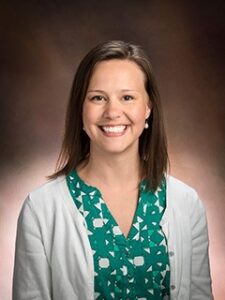The Kortney Rose Foundation (KRF) is excited to announce that Dr. Cassie Kline has been named the inaugural The Kortney Rose Foundation Clinical Researcher in Neuro-Oncology at Children’s Hospital of Philadelphia (CHOP). Dr. Kline recently joined CHOP as the Director of Neuro-Oncology Clinical Research. KRF will support Dr. Kline in her work to develop and run clinical trials of new treatment strategies for children with brain tumors. (click here to read Dr. Kline’s bio.) She currently leads four clinical trials as study chair or co-chair and is involved in the development of several other clinical trials and will continue this focus at CHOP.
“It is unacceptable to me that after decades of research, we are still forced to give our patients and families news of incurable brain tumors with no standard of care therapy. In joining the Brain Tumor Center within the Division of Oncology at the Children’s Hospital of Philadelphia and representing KRF as the first-ever KRF Clinical Research in Neuro-Oncology, I look forward to growing treatment options for children and young adults with central nervous system tumors. Within the rich environment of CHOP, I am excited to expand KRF’s impact by bringing together basic scientists, neurosurgeons, collaborators within the Children’s Brain Tumor Network, colleagues within our Brain Tumor Center, and across consortia to expand novel therapies and create rapid pipelines to bring them to patients. I am confident that by building such robust collaborations, we will make great advances towards finding new cures.”
Cassie Kline, MD, MAS
The Kortney Rose Foundation Clinical Researcher in Neuro-Oncology, (CHOP)
Attending Physician
Director, Neuro-Oncology Clinical Research
Division of Oncology, The Children’s Hospital of Philadelphia (CHOP)
Director of Data Quality and Integration, Pacific Pediatric Neuro-Oncology Consortium (www.pnoc.us)
Diffuse intrinsic midline gliomas (DIPG) is a deadly childhood brain cancer. During the past decade, we have learned a great deal about the molecular landscape of DIPG including mutations associated with histone encoding genes (H3K27M). Since this discovery, we have learned that other diffuse midline gliomas (DMG) occurring in different brain midline structures including the spinal cord, also carry this specific mutation and have the same dismal outcome as DIPG. However, clinical translation of laboratory findings has been lagging. We know that DMGs will require a multipronged approach where smart drug combinations can target multiple tumorigenic pathways. We also know that most drugs that can kill tumor cells in petri dish, fail to eradicate tumor cells in animal models. These observations indicate the need to challenge the current approach of isolated laboratories trying to solve these problems in isolation.
In order to address these shortcomings, we have formed a multidisciplinary, international and collaborative program called the DMG-Adaptive and Combinatorial Trial (DMG-ACT) program. A group of 15 international institutions have joined to develop a preclinical platform that will allow testing of combination therapies in multiple model systems, share data in real-time, and validate observations across multiple laboratories. The Kortney Rose Foundation is excited to support pre-clinical work for the DMG-ACT. The Head of the Clinical Program of the DMG Center, Zurich is internationally recognized pediatric neuro-oncologist Sabine Meuller, MD, Ph.D., MAS working with the Head of the DMG Research Center, Zurich, Dr. Javad Nazarian, Ph.D. from the Center of Genetic Medicine at Children’s National Medical Center, Washington D.C.
– Dr. Javad Nazarian, Ph.D. from the Center of Genetic Medicine at Children’s National Medical Center, Washington D.C.
 “The study that the Kortney Rose Foundation is supporting will help speed the pace of brain tumor immunotherapy research at Children’s Hospital of Philadelphia. The study has developed CAR T-cells that show early efficacy in neuroblastoma mouse models, and they are seeing similar efficacy for high grade glioma cell lines. We are immensely grateful for your generosity to help fast-track this important research to discover better treatments for children as quickly as possible.”
“The study that the Kortney Rose Foundation is supporting will help speed the pace of brain tumor immunotherapy research at Children’s Hospital of Philadelphia. The study has developed CAR T-cells that show early efficacy in neuroblastoma mouse models, and they are seeing similar efficacy for high grade glioma cell lines. We are immensely grateful for your generosity to help fast-track this important research to discover better treatments for children as quickly as possible.”
– Dr. Jessica Foster, M.D., attending physician in the Division of Oncology at Children’s Hospital of Philadelphia.
We are excited to be investing in a promising immunotherapy research project being led by Dr. Jessica Foster out of the Center for Data Driven Discovery in Biomedicine at CHOP and is part of the Open DIPG project. Dr. Foster has identified a common protein on the cells of several of the most deadly types of brain tumors. Using this protein as a target, researchers are working to develop new chimeric antigen receptor (CAR) T-cell immunotherapies that will save children’s lives.
 “Just because a new medication works on cancer cells in a petri dish or mice doesn’t mean it will work in children or is safe in children. It is crucial to carefully and responsibly test new therapies…at present, we have over 30 open clinical trials for children with brain tumors. However, it is crucial to expand our clinical research program so that we can support the development and testing of new cutting edge therapies as well as expand the treatment options available for our patients today.”
“Just because a new medication works on cancer cells in a petri dish or mice doesn’t mean it will work in children or is safe in children. It is crucial to carefully and responsibly test new therapies…at present, we have over 30 open clinical trials for children with brain tumors. However, it is crucial to expand our clinical research program so that we can support the development and testing of new cutting edge therapies as well as expand the treatment options available for our patients today.”
– Dr. Michael J. Fisher, Chief of the Section of Neuro-Oncology, Children’s Hospital of Philadelphia
The Children’s Hospital of Philadelphia’s Neuro-Oncology Department sees more patients than any other children’s hospital in the country. The increase in patients that come through their unit has caused a need for growth in their program for clinician/researchers to adequately care for the patients as well as work on research to find better treatments and cures. The Kortney Rose Foundation is proud to be investing in this growth over the next couple of years.
